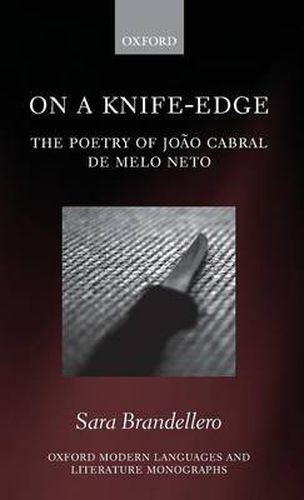Readings Newsletter
Become a Readings Member to make your shopping experience even easier.
Sign in or sign up for free!
You’re not far away from qualifying for FREE standard shipping within Australia
You’ve qualified for FREE standard shipping within Australia
The cart is loading…






On a Knife-Edge represents the first book-length study in English solely devoted to the work of Joao Cabral de Melo Neto (1920-1999), one of Brazil’s foremost poets of the twentieth century and a unique voice within Brazilian Modernism. It concentrates on the poet’s later works, from A escola das facas (1980) to Andando Sevilha (1990), providing a comprehensive overview of a body of work which has so far attracted limited critical attention. Sara Brandellero reviews traditional readings of Cabral as a poet of clarity and precision, and demonstrates how ambiguity in language, imagery, and even structure was an integral part of his writing and contributed to the political impact of his work. The blurring of the opposition between life and death through the image of the knife-edge, central to the first of the works examined, provides a productive starting point for the analysis of the role of the in-between space, (or ‘entre-lugar’, as defined by Silviano Santiago) in Cabral’s writing. The knife-edge reflects the poet’s obsession with the transience of existence and conveys the violence and deprivation of his native Brazil, where life is in a constant state of flux. On a meta-textual level, it encapsulates Cabral’s vision of his writing as a continual negotiation of the boundaries between poetry and prose, and evokes his sense of the elusiveness of language and of the endless possibilities that the act of writing implies. Thus, the in-between space gave Cabral new scope, as a postcolonial writer, to enter in dialogue with poetic tradition at home and abroad. Through his resistance to rigid categorizations, such as in representations of gender, and thematic exploration of grey areas such as haunting, insoluble crimes, or even the labyrinthine geography of Seville, he sought to unmask the inequities of Brazil’s past and the challenges of its present.
$9.00 standard shipping within Australia
FREE standard shipping within Australia for orders over $100.00
Express & International shipping calculated at checkout
On a Knife-Edge represents the first book-length study in English solely devoted to the work of Joao Cabral de Melo Neto (1920-1999), one of Brazil’s foremost poets of the twentieth century and a unique voice within Brazilian Modernism. It concentrates on the poet’s later works, from A escola das facas (1980) to Andando Sevilha (1990), providing a comprehensive overview of a body of work which has so far attracted limited critical attention. Sara Brandellero reviews traditional readings of Cabral as a poet of clarity and precision, and demonstrates how ambiguity in language, imagery, and even structure was an integral part of his writing and contributed to the political impact of his work. The blurring of the opposition between life and death through the image of the knife-edge, central to the first of the works examined, provides a productive starting point for the analysis of the role of the in-between space, (or ‘entre-lugar’, as defined by Silviano Santiago) in Cabral’s writing. The knife-edge reflects the poet’s obsession with the transience of existence and conveys the violence and deprivation of his native Brazil, where life is in a constant state of flux. On a meta-textual level, it encapsulates Cabral’s vision of his writing as a continual negotiation of the boundaries between poetry and prose, and evokes his sense of the elusiveness of language and of the endless possibilities that the act of writing implies. Thus, the in-between space gave Cabral new scope, as a postcolonial writer, to enter in dialogue with poetic tradition at home and abroad. Through his resistance to rigid categorizations, such as in representations of gender, and thematic exploration of grey areas such as haunting, insoluble crimes, or even the labyrinthine geography of Seville, he sought to unmask the inequities of Brazil’s past and the challenges of its present.